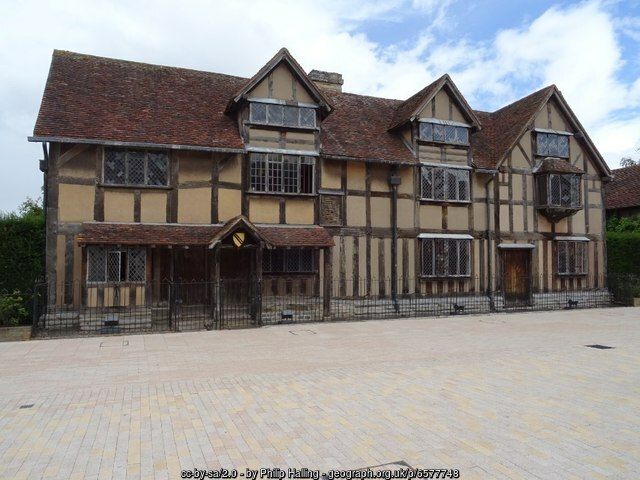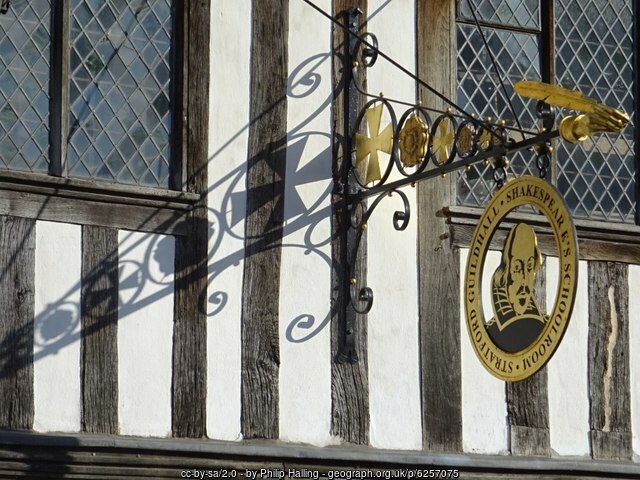Lest we forget...
"They Shall Not Grow Old"
World War I and the family who made the ultimate sacrifice
I am writing this on the morning of 11 November, Armistice Day, watching the clock countdown to 11am. It was at 11am on this day in 1918 when the guns fell silent after more than four years of war. At the time it was known as the Great War, now we refer to it as World War I. On this day I tend to reflect on my grandparents’ generation and how the war impacted on them. Dan, a brother of my maternal grandmother, died in July 1917 in Tehran. He died from heatstroke; he wasn’t killed in action. My maternal grandfather had been called up and had his medical, but fortunately for him the war ended before he commenced training. My paternal grandfather, Arthur was in a reserve occupation; he was a farmer. He was one of six brothers. One other brother, Albert was also in a reserve occupation, he was a farm labourer. The other four brothers, Tom, John, Fred and William enlisted. Tom is pictured in this blog on horseback, he joined the Army Veterinary Corps (AVC). Miraculously, all four brothers survived the war. Sadly, for many this was not the case.
A visit to Great Rissington church on the Cotswolds, and a look at the war memorial at the names of those who fell in the Great War (WWI) and we are reminded of the high price many families paid during that conflict. I first visited this church some years ago and as I cast my eye over the list of names on the war memorial, I noticed one name more than once. The family name was Souls. Listed on the war memorial are the names, Albert Souls (d.1916), Frederick Souls (d.1916), Walter Souls (d.1916), Arthur Souls (d.1918) and Alfred Souls (d.1918).
Albert, the youngest, along with Walter, were the first to enlist. Albert was the first brother to be killed. Identical twins, Alfred and Arthur died just five just days apart in 1918. Walter wrote a postcard in his hospital bed, but before the postcard reached home he died from a blood clot. The body of fifth brother Fred was never found. His mother, Annie always kept a candle burning in the window of her home hoping one day he’d return.
After the war their mother Annie Souls would never stand for the national Anthem, God Save the King. Eventually, she left the village, to avoid the heartless gossip about how well off she must be receiving the pensions (one shilling a week) from each of her five dead sons.
With the war over there was yet more tragedy for Annie Soul, her sixth son, a younger brother named Percy, still at school during the war, and too young to serve, sadly died from meningitis.
The Imperial War Museum and the Commonwealth War Graves Commission know of no greater sacrifice by a British family.
In total contrast, nearby is the village of Upper Slaughter (an ironic village name but its name means ‘muddy place’), a double “Thankful Village”, a village which lost no one in either WWI or WWII! But that’s another story.
11 November 2025
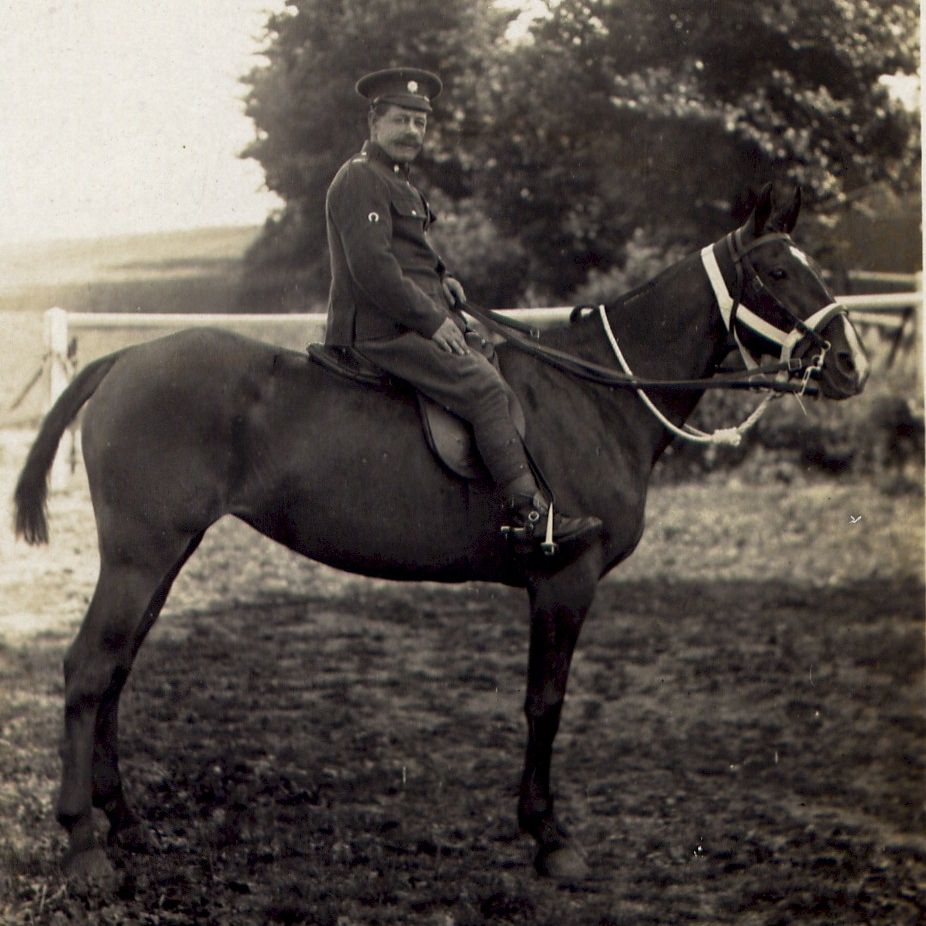
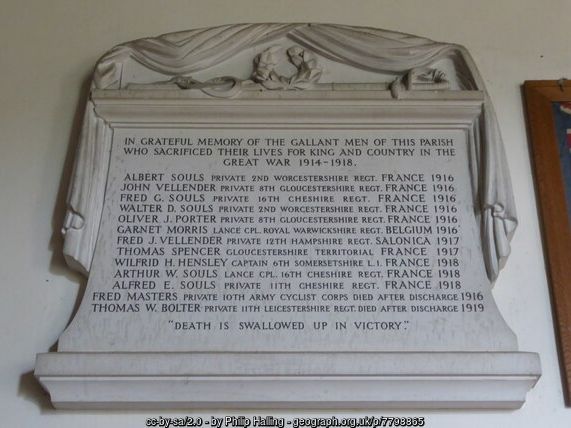
The Battle of Worcester
The final battle of the English Civil War
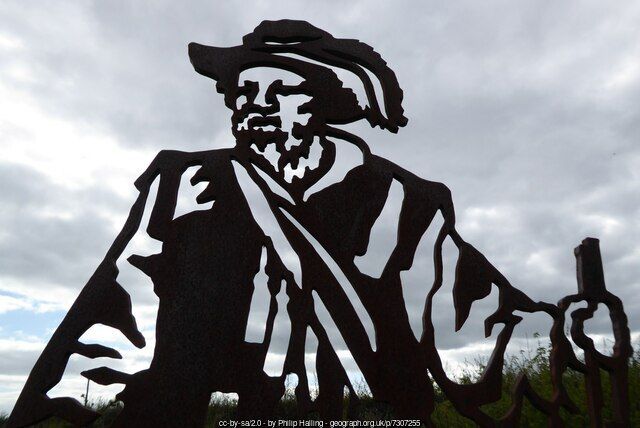
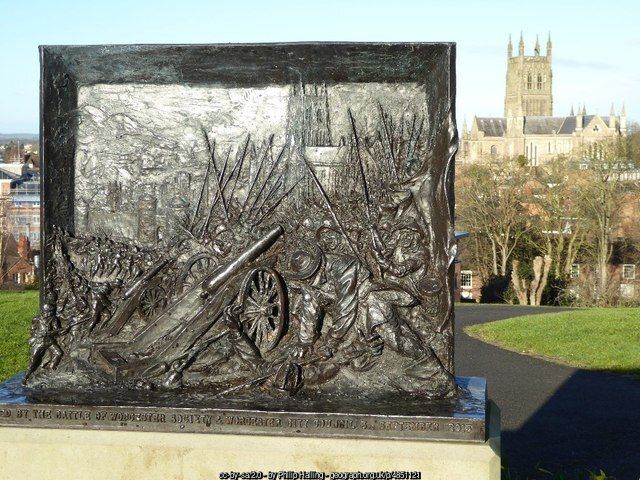
On the 3 September 1651 the Battle of Worcester took place, the last battle of the English Civil War (also known as the Wars of the Three Kingdoms).
Charles I had been defeated and captured, and then put on trial in January 1649 (1648 Old Style). Found guilty of treason he was executed in Whitehall in London. Two years later his son, the future Charles II returned from exile and after being crowned king in Edinburgh, entered England with a force made up largely of Scots. The hope being that as they marched through England more would join, however, few did.
They arrived in the city of Worcester on 22 August, with Charles at the head of around 16,000 men. Worcester has the epithet the ‘Faithful City’ however, this is a label most likely given to the city after the Restoration of Charles II in 1660.
Having reached Worcester, preparations was made to defend the city, for example, rapidly preparing a redoubt to defend the city. It’s prominent position overlooking the city would play a key role in the battle. Still to this day it is known as Fort Royal Hill and offers fine views over the cathedral.
Alas, this was all in vain for the Parliamentary forces under Oliver Cromwell had encircled the city and with the capture of the redoubt on Fort Royal Hill the fate of Charles and his army was sealed; the Parliamentarian forces defeated the royalist army. A last chance desperate Royalist cavalry charge led by the Earl of Cleveland and Major Careless was made along High Street and Sidbury Street, providing King Charles the opportunity to escape the city by St Martin's Gate. After escaping Worcester, and hiding in an oak, it was another six weeks before he slipped away into exile on the continent, but that’s another story!
3 September 2025
The Cotswold Olimpicks
An annual games with four centuries of history
Each year on the evening of the last Friday in May the Cotswold Olimpicks takes place on Dover’s Hill near the picturesque Cotswolds village of Chipping Campden. The games were founded by local resident Robert Dover. Though born in Norfolk he settled in nearby Saintbury after studying law at Queens’ College, Cambridge, and working as a lawyer at Lincoln’s Inn in London. The first games are believed to have taken place in 1612. It’s believed the games were supported by Baptist Hicks, a rich Chipping Campden mercer or cloth dealer.
Though it is more than four centuries since the first games there have been periods when the games did not take place. By the 1630s puritanism was on the rise. The games ceased to take place as a result of the Puritans general dislike of entertainment and events such as sporting contests, racing, dancing, singing, and basically people having fun. The Civil War of the 1640s followed, and the defeat of the king, resulting in the Commonwealth and rule of Oliver Cromwell. The games returned with the Restoration of the Monarchy with King Charles II in 1660. After the hiatus the games proved as popular as ever and continued until 1862 when the land became unavailable. In 1951, as part of the Festival of Britain the games were revived and from 1963 the Cotswold Olimpicks have taken place in most years. The games of 2012 being particularly special because they coincided with Queen Elizabeth II’s Diamond Jubilee and the London Olympics.
The games take place in a natural amphitheatre on the Cotswold escarpment with fine views over the Warwickshire and Worcestershire beyond. Events include running, tug-o-war, and the Champion of the Hill, this is like a forerunner of modern events such as the pentathlon. In this Individual competitors compete in 4 separate events. These are: Static Jump (jumping as far as possible from a standstill), Spurning the Barre (similar to the Scottish tossing the caber), the Hammer Throw and Putting the Shot. The competitor with the highest combined score is the winner. Championship of the Hill is an event for teams of six and involves carrying water in buckets with holes; the leaking water soaking the contestants. Echoes of ‘It’s a Knockout’!
The best known competition is ‘Shin Kicking’, this event goes back to the origins of the games. Two competitors try to put their opponent down on the ground by kicking their shins. Each competitor must wear soft shoes, and the only protection to fend off the kicks is to stuff straw down one’s trousers. It is a knockout competition with the eventual winner the victorious finalist. Fair play is ensured by the umpire who is known as the ‘Stickler’ and has a stick to ensure the rules are complied with. The word ‘stickler’ may well originate from the obsolete Middle English word "stighteler," meaning, one who ‘arranges’, is a ‘moderator’, or ‘mediator’. Today we have the expression ‘a stickler for the rules’.
The evening concludes with a firework display and the lighting of the beacon, followed by a torchlit procession down into Chipping Campden.

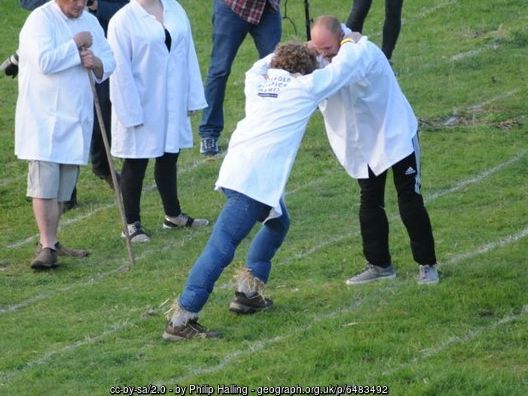
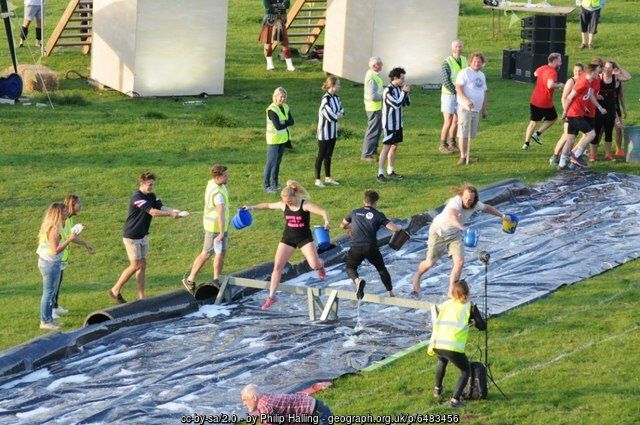
Admiral Sir William Tennant
85 years after Dunkirk, a hero remembered

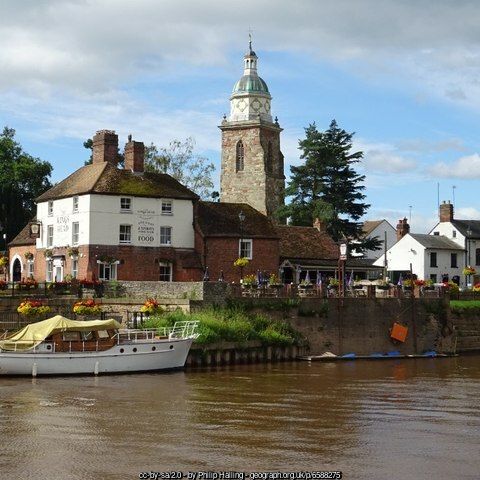
Upton-upon-Severn in Worcestershire is a small town popular with visitors and each year hosts a number of festivals, including a Folk Festival, Jazz Festival and the Blues Festival. In the town centre, in the town’s former churchyard below the famous ‘Pepperpot Tower’ you may notice a bust to an Admiral who fought in two world wars.
The film the ‘Darkest Hour’, with Gary Oldman playing Winston Churchill, is set at the time leading up to the Dunkirk Evacuation when many British and French soldiers were surrounded by Nazi forces trapping them on the beaches. Heroically around 330,000 soldiers were rescued by the Royal Navy, along with merchant ships, and a flotilla of civilian boats, yachts, and pleasure craft. One of the key men in getting soldiers off the beaches was a man born in Upton-upon-Severn, his name was Admiral William Tennant, though it was after the war that he was promoted to Admiral. As beach master he played a key role in in coordinating the evacuation off the beaches. In the 2017 film ‘Dunkirk’ his role inspired that of Kenneth Branagh's character, Commander Bolton.
Four years later, in the summer of 1944, the then Vice Admiral William Tennant was in charge of towing across the English Channel the components to create the two artificial Mulberry harbours set off the Normandy coast. Remains of which can be still seen today. His efforts contributing to the success of the D-Day landings, was recognised with him being awarded the CBE by King George VI and the US Legion of Merit.
Born in Upton-upon-Severn in 1890 he was educated at Hanley Castle Grammar School, just a mile or so up the road. In 1905, at the age of 15 William Tennant joined the Royal Navy as a cadet at the Royal Naval College at Dartmouth. During World War I he survived the sinking of HMS Nottingham in the weeks after Jutland in 1916. Again in World War II he survived a sinking. He was in command of HMS Repulse and had successfully dodged nineteen torpedoes dropped from Japanese aircraft, before being hit by five more torpedoes. Repulse sank in the South China Sea in 15 minutes. This took place on 10 December 1941, three days after the Japanese attack on Pearl Harbor. Earlier in the war, in June 1940, William Tennant had become captain of the battlecruiser Repulse, which had engaged in battles against the German battleships Scharnhorst and Gneisenau, and later took part in the hunt for the battleship Bismarck.
In 1950, Admiral William Tennant became the Lord Lieutenant of Worcestershire, the Monarch’s representative in the county; he remained in this role until his death in 1963. His grave is in the churchyard of Queenhill Church, very close to the passing M50 motorway.
William Shakespeare
He was not of an age, but for all time!
William Shakespeare is known around the world as a playwright and is consider one of the greatest Britons. Ben Johnson, his friend and fellow playwright described Shakespeare as “He was not of an age, but for all time!”. Despite his fame he came from modest origins.
His father was a glove maker, born in the village of Snitterfield, but moved into the nearby town of Stratford-upon-Avon, living and working in a house on Henley Street. We know he was living there in 1552 for on 29 April he was fined one shilling for creating a ‘midden heap’ (muck heap) in Henley Street. That same house today draws visitors from all over the world; the house in which William Shakespeare was born in 1564. Traditionally April 23 is assumed to be his birthday, though we don’t know this for sure. We do know he was baptised in the local parish local parish church of Holy Trinity on 26 April. In Elizabethan England, baptism took place within three days of the birth. In Holy Trinity Church there is a facsimile on display recording his baptism, along with one for his burial on 25 April 1616. His baptism is recorded in Latin; his burial is in English.
William’s father became an Alderman and member of Stratford Corporation. In 1568, he became the town’s High Bailiff, equivalent to today’s Mayor. The Corporation held meetings in the Guildhall, the building which still stands today, has an upper floor containing the schoolroom where a young William Shakespeare was educated. Undoubtedly the Guildhall and Schoolroom influenced and shaped William’s life. Here he read Roman poet Ovid, and almost certainly will have seen travelling theatre companies such as Leicester’s Men and Worcester’s Men performing plays to the members of the Corporation. Today, you can visit Stratford’s Guildhall and Shakespeare’s Schoolroom and sit on one of the eight forms (benches from where today we get the term school form) and experience an Elizabethan lesson with a master in role play. And what makes this building special, it’s not just a museum and visitor attraction, but until 11am each morning it is still used as a schoolroom by pupils of King Edward VI’s School!
April 2025
